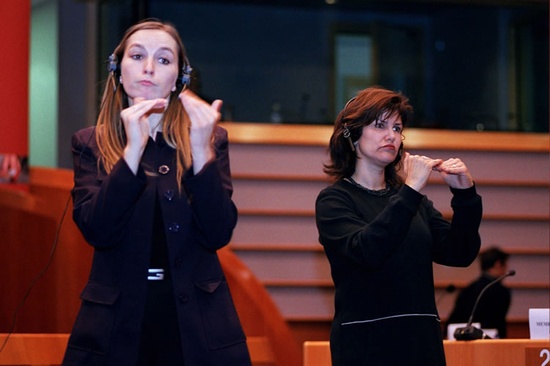Will the #realinterpreter please stand up? Seattle outs their own #fakeinterpreter
Posted by: Staff Writer on Dec. 16, 2013

With real-life plot twists that would make both the National Inquirer and The Onion covet its headlines, the #fakeinterpreter story continues to play on a world stage.
Perhaps the greatest irony is not that it happened at Nelson Mandela's memorial, but what the first deaf person to be elected to the South African Parliament said about it: "When a deaf person complains, nobody listens," said Wilma Newhoudt-Druchen, who was among the first to "out" Thamsanqa Jantjie via series of outraged tweets.
Hardly so, Ms. Newhoudt-Drucken. At least not here in Seattle, where a tech-savvy and self-labeled "Concerned Deaf Citizens" movement has spawned overnight.
Less than 20 hours after Jantjie's so-called schizophrenic episode, clear-eyed local deaf, hard of hearing, and Allied citizens in Seattle seized the opportunity to right an impunity that's been playing on a far different stage: The Seattle Men's Chorus (SMC)'s refusal to replace its self-labeled interpreter Kevin Gallagher with a qualified, certified ASL interpreter.
As Washington's largest and most influential choral organization, SMC is considered a local treasure. So why is it not heeding the growing dissatisfaction of deaf/HH patrons?
Last Thursday, an open letter was addressed first to marketing outreach coordinator Liz Dawson and then to Flying Chorus Production's Executive Director Frank Stilwagner. After a 48-hour deadline passed with no official reply, a MoveOn.org petition began circulating. There are 450 signatures and climbing quickly as of Tuesday morning.
The Deaf Community has beat the dead horse since 1989: That was the year when two deaf women, including open letter co-author Marilyn Jean Smith, met with the Chair of the Board of SMC in a meeting facilitated by the director of the Pride Foundation. Suggestions of compromise were well-received ... by everyone except Gallagher himself, Smith recounted. Countless letters and complaints have since then fallen mostly on (no pun intended) deaf ears.
It was also the year that the Registry of Interpreters for the Deaf (RID) changed its examination process significantly for interpreters looking to become certified. What was once a three-part exam (interview, interpreting, and transliteration) became a two-part exam (writing exam, followed by a skills portion).
The standards keep climbing: As of last year, interpreting applicants are now required to have a minimum of a BA degree.
If training standards for interpreters change over time, there should be no tenure mindset. Never mind that Gallagher is already such a fixture that on Seattle Men's Chorus' Wikipedia page, he is listed as one of the five members along with its artistic director.
"We are very concerned about his lack of concern for his poor quality of interpreting and unethical behavior towards the hearing and deaf patrons alike," the open letter said.
Much like sign language experts worldwide offered a multitude of reasons for why Jantjie's hand motions could not be the real thing, the open letter (co-written by Seattle Central Community College ASL professor Katie Roberts) highlighted various shortcomings in Gallagher's technique. They include mismatched facial expressions, inaccurate transliteration, and broken ASL grammar rules.
"At a bare minimum, people are being made aware of this and it cannot be silenced and shoved under a rug like so many times before," wrote Crystal Plum Green, who also co-authored the open letter. "The power of social media is that it is a great equalizer and a great way to ask for change."
Instead of shooting the messenger (in this case, terps-for-hire such as Jantjie and Gallagher), the real question we ought to ask ourselves is: What qualifies a "messenger" in the first place?
So-called language agencies are abundant, all competing for your dollars and referrals. But here's 3 simple ways to separate the wheat from the chaff:
1) Does the agency exclusively specialize in providing sign language services? Many agencies boast a wide array of language options ranging from Azerbaijani to Zulu. But, remember, interpreting agencies that specialize in sign language will always have a better understanding of what deaf and hard of hearing customers need.
2) Is the agency transparent about its interpreters' certifications? In the USA, the key acronyms to look for are, at a minimum, National Interpreters Certification (NIC). This national certification is offered via RID, along with the NIC-Advanced and NIC-Masters. Hiring an interpreter without first inquiring about this accreditation is much like allowing anyone with a scalpel set to operate on your heart (case in point: Dustin Pelloni the CODA founder of CLIP Interpreting was inspired to become an interpreter, after learning that his deaf mother was having seizures as a result of the wholly unqualified sign language interpreter hired by her doctor's office).
3) Does the agency remain in good standing among the local Deaf Community? When in doubt, ask a long-time deaf local about the quality of interpreters coming from Agency XYZ. Because the first and foremost function of an agency is to meet the needs of deaf, hard of hearing, and deaf-blind clients, these are the opinions to look for - not those of adoring hearing fans who rejoice over signs produced by anyone who proclaims to be an interpreter.
Currently, a petition and media outreach is underway regarding the #SMCfakeinterpreter here. A thoughtful dialogue is evolving across social media pages that encourage community members to work with local businesses diligently and respectfully.
There is one more powerful action item you can tackle, straight from the grassroots: You can write a review on deafREVIEW about businesses who do (or don’t) invest in our Community’s well-being. Your feedback helps educate businesses on what they are doing right and how they can improve.
“Education is the most powerful weapon which you can use to change the world.”
― Nelson Mandela
Tags
- nelson mandela
- wilma newhoudt-druchen
- thamsanqa jantjie
- seattle mens chorus
- kevin gallagher
- registry of interpreters for the deaf
- american sign language interpreter
- deaf
- hard of hearing
- fakeinterpreter
- realinterpreter
- hiring a qualified asl interpreter




Comments